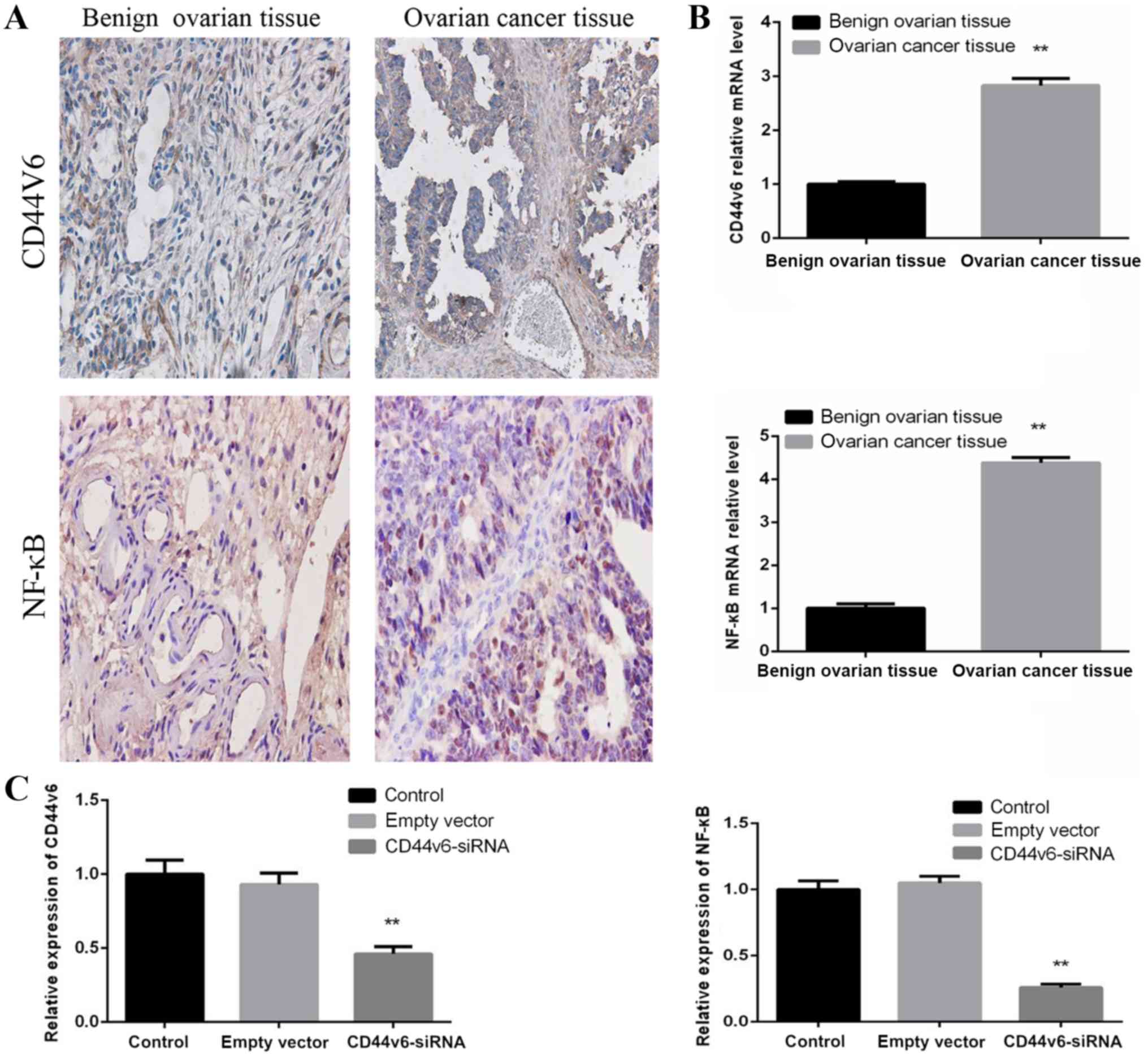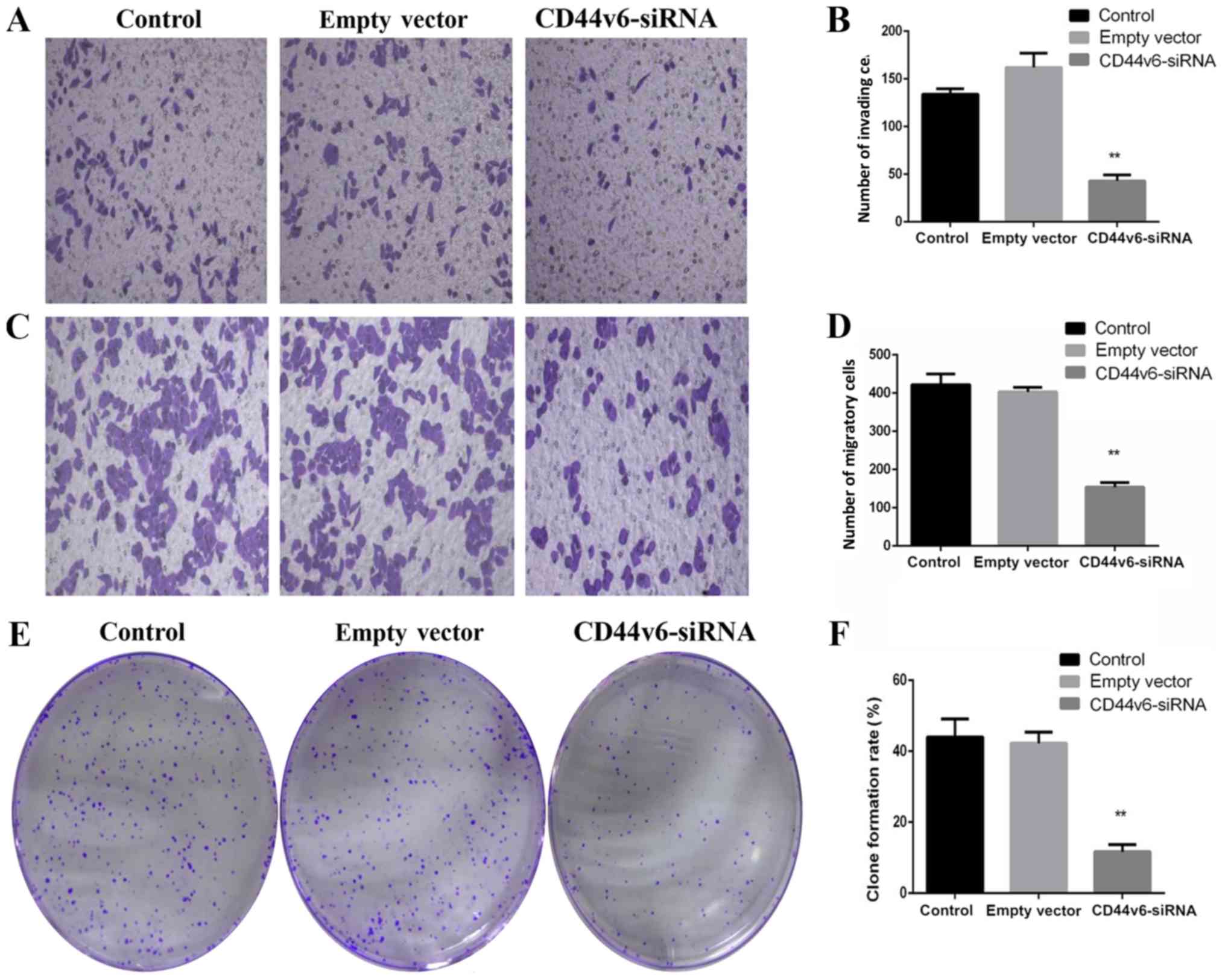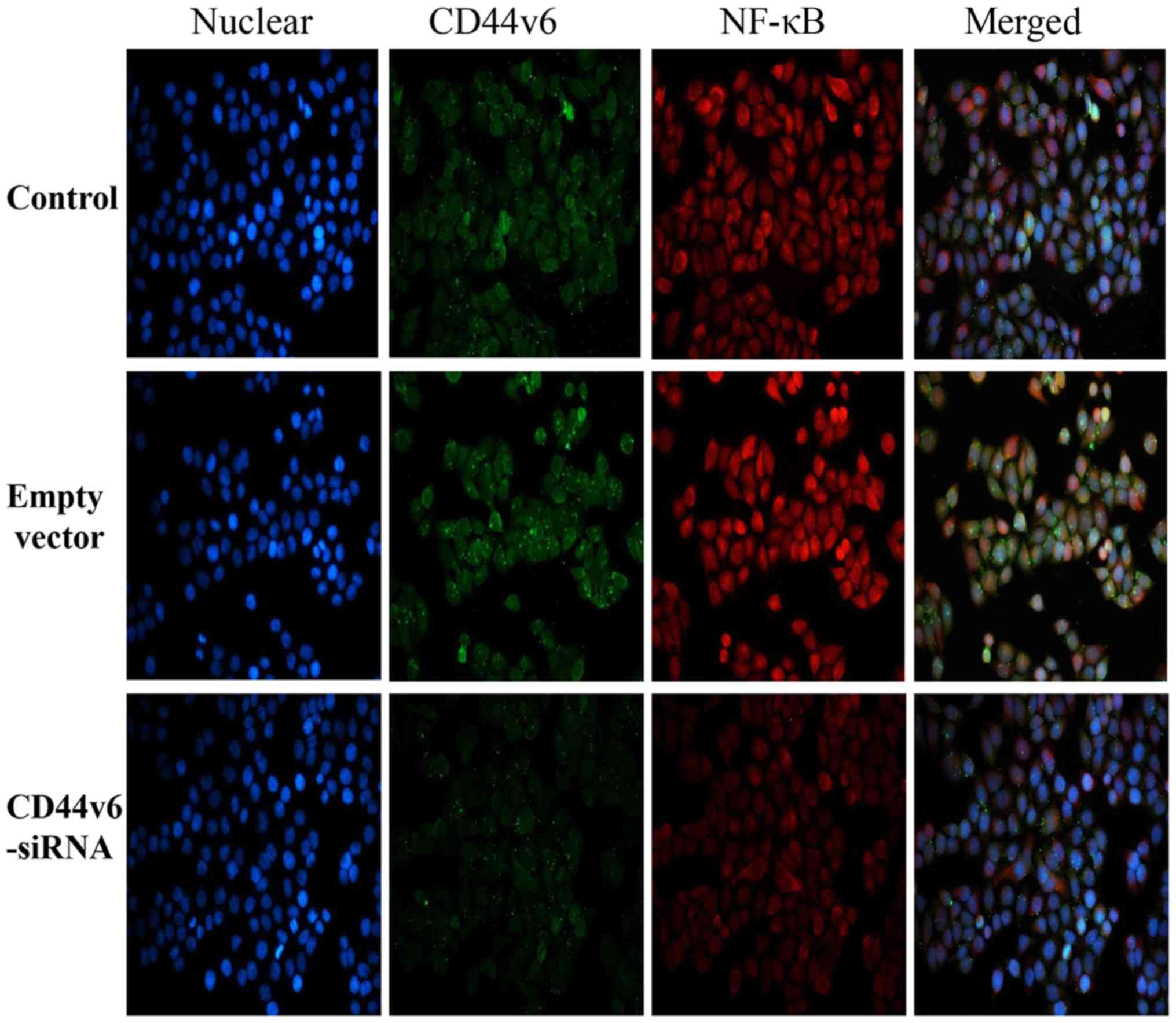|
1
|
Towne SD Jr: Socioeconomic, Geospatial,
and Geopolitical disparities in access to health care in the US
2011-2015. Int J Environ Res Public Health. 14:5732017. View Article : Google Scholar
|
|
2
|
Torre LA, Trabert B, DeSantis CE, Miller
KD, Samimi G, Runowicz CD, Gaudet MM, Jemal A and Siegel RL:
Ovarian cancer statistics, 2018. CA Cancer J Clin. 68:284–296.
2018. View Article : Google Scholar : PubMed/NCBI
|
|
3
|
Yap TA, Carden CP and Kaye SB: Beyond
chemotherapy: Targeted therapies in ovarian cancer. Nat Rev Cancer.
9:167–181. 2009. View
Article : Google Scholar : PubMed/NCBI
|
|
4
|
Kujawa KA and Lisowska KM: Ovarian
cancer-from biology to clinic. Postepy Hig Med Dosw (Online).
69:1275–1290. 2015.(In Polish). View Article : Google Scholar : PubMed/NCBI
|
|
5
|
Screaton GR, Bell MV, Bell JI and Jackson
DG: The identification of a new alternative exon with highly
restricted tissue expression in transcripts encoding the mouse
Pgp-1 (CD44) homing receptor. Comparison of all 10 variable exons
between mouse, human, and rat. J Biol Chem. 268:12235–12238.
1993.PubMed/NCBI
|
|
6
|
Jackson DG, Buckley J and Bell JI:
Multiple variants of the human lymphocyte homing receptor CD44
generated by insertions at a single site in the extracellular
domain. J Biol Chem. 267:4732–4739. 1992.PubMed/NCBI
|
|
7
|
Prochazka L, Tesarik R and Turanek J:
Regulation of alternative splicing of CD44 in cancer. Cell Signal.
26:2234–2239. 2014. View Article : Google Scholar : PubMed/NCBI
|
|
8
|
Saegusa M, Machida D, Hashimura M and
Okayasu I: CD44 expression in benign, premalignant, and malignant
ovarian neoplasms: Relation to tumour development and progression.
J Pathol. 189:326–337. 1999. View Article : Google Scholar : PubMed/NCBI
|
|
9
|
Zhang S, Balch C, Chan MW, Lai HC, Matei
D, Schilder JM, Yan PS, Huang TH and Nephew KP: Identification and
characterization of ovarian cancer-initiating cells from primary
human tumors. Cancer Res. 68:4311–4320. 2008. View Article : Google Scholar : PubMed/NCBI
|
|
10
|
Yae T, Tsuchihashi K, Ishimoto T, Motohara
T, Yoshikawa M, Yoshida GJ, Wada T, Masuko T, Mogushi K, Tanaka H,
et al: Alternative splicing of CD44 mRNA by ESRP1 enhances lung
colonization of metastatic cancer cell. Nat Commun. 3:8832012.
View Article : Google Scholar : PubMed/NCBI
|
|
11
|
Zoller M: CD44: Can a cancer-initiating
cell profit from an abundantly expressed molecule? Nat Rev Cancer.
11:254–267. 2011. View
Article : Google Scholar : PubMed/NCBI
|
|
12
|
Dallas MR, Liu G, Chen WC, Thomas SN,
Wirtz D, Huso DL and Konstantopoulos K: Divergent roles of CD44 and
carcinoembryonic antigen in colon cancer metastasis. FASEB J.
26:2648–2656. 2012. View Article : Google Scholar : PubMed/NCBI
|
|
13
|
Ishimoto T, Nagano O, Yae T, Tamada M,
Motohara T, Oshima H, Oshima M, Ikeda T, Asaba R, Yagi H, et al:
CD44 variant regulates redox status in cancer cells by stabilizing
the xCT subunit of system xc(−) and thereby promotes tumor growth.
Cancer Cell. 19:387–400. 2011. View Article : Google Scholar : PubMed/NCBI
|
|
14
|
Nagano O, Okazaki S and Saya H: Redox
regulation in stem-like cancer cells by CD44 variant isoforms.
Oncogene. 32:5191–5198. 2013. View Article : Google Scholar : PubMed/NCBI
|
|
15
|
Li XP, Zhang XW, Zheng LZ and Guo WJ:
Expression of CD44 in pancreatic cancer and its significance. Int J
Clin Exp Pathol. 8:6724–6731. 2015.PubMed/NCBI
|
|
16
|
Ouhtit A, Rizeq B, Saleh HA, Rahman MM and
Zayed H: Novel CD44-downstream signaling pathways mediating breast
tumor invasion. Int J Biol Sci. 14:1782–1790. 2018. View Article : Google Scholar : PubMed/NCBI
|
|
17
|
Abbasian M, Mousavi E, Arab-Bafrani Z and
Sahebkar A: The most reliable surface marker for the identification
of colorectal cancer stem-like cells: A systematic review and
meta-analysis. J Cell Physiol. 234:8192–8202. 2019. View Article : Google Scholar : PubMed/NCBI
|
|
18
|
Gunthert U, Hofmann M, Rudy W, Reber S,
Zöller M, Haussmann I, Matzku S, Wenzel A, Ponta H and Herrlich P:
A new variant of glycoprotein CD44 confers metastatic potential to
rat carcinoma cells. Cell. 65:13–24. 1991. View Article : Google Scholar : PubMed/NCBI
|
|
19
|
Liotta LA, Delisi C, Saidel G and
Kleinerman J: Micrometastases formation: A probabilistic model.
Cancer Lett. 3:203–208. 1977. View Article : Google Scholar : PubMed/NCBI
|
|
20
|
Okayama H, Kumamoto K, Saitou K, Hayase S,
Kofunato Y, Sato Y, Miyamoto K, Nakamura I, Ohki S, Sekikawa K and
Takenoshita S: CD44v6, MMP-7 and nuclear Cdx2 are significant
biomarkers for prediction of lymph node metastasis in primary
gastric cancer. Oncol Rep. 22:745–755. 2009.PubMed/NCBI
|
|
21
|
Kawano T, Nakamura Y, Yanoma S, Kubota A,
Furukawa M, Miyagi Y and Tsukuda M: Expression of E-cadherin, and
CD44s and CD44v6 and its association with prognosis in head and
neck cancer. Auris Nasus Larynx. 31:35–41. 2004. View Article : Google Scholar : PubMed/NCBI
|
|
22
|
Gu H, Shang P and Zhou C: Expression of
CD44v6 and E-cadherin in prostate carcinoma and metastasis of
prostate carcinoma. Zhonghua Nan Ke Xue. 1032–34. (38)2004.(In
Chinese). PubMed/NCBI
|
|
23
|
Afify AM, Tate S, Durbin-Johnson B, Rocke
DM and Konia T: Expression of CD44s and CD44v6 in lung cancer and
their correlation with prognostic factors. Int J Biol Markers.
26:50–57. 2011. View Article : Google Scholar : PubMed/NCBI
|
|
24
|
Stickeler E, Vogl FD, Denkinger T, Mobus
VJ, Kreienberg R and Runnebaum IB: Soluble CD44 splice variants and
pelvic lymph node metastasis in ovarian cancer patients. Int J Mol
Med. 6:595–601. 2000.PubMed/NCBI
|
|
25
|
Sun Y, Shen Z and Ji X: Study on the
relationship between CD44v6, p53 gene mutation and ovarian
carcinoma metastasis. Zhonghua Fu Chan Ke Za Zhi. 35:225–228.
2000.(In Chinese). PubMed/NCBI
|
|
26
|
Bar JK, Grelewski P, Popiela A, Noga L and
Rabczynski J: Type IV collagen and CD44v6 expression in benign,
malignant primary and metastatic ovarian tumors: Correlation with
Ki-67 and p53 immunoreactivity. Gynecol Oncol. 95:23–31. 2004.
View Article : Google Scholar : PubMed/NCBI
|
|
27
|
Hong SC, Song JY, Lee JK, Lee NW, Kim SH,
Yeom BW and Lee KW: Significance of CD44v6 expression in
gynecologic malignancies. J Obstet Gynaecol Res. 32:379–386. 2006.
View Article : Google Scholar : PubMed/NCBI
|
|
28
|
Liotta LA, Delisi C, Saidel G and
Kleinerman J: Micrometastases formation: A probabilistic model.
Cancer Lett. 3:203–208. 1977. View Article : Google Scholar : PubMed/NCBI
|
|
29
|
Ricciardelli C, Lokman NA, Ween MP and
Oehler MK: Women in Cancer Thematic Review: Ovarian
cancer-peritoneal cell interactions promote extracellular matrix
processing. Endocr Relat Cancer. 23:T155–T168. 2016. View Article : Google Scholar : PubMed/NCBI
|
|
30
|
Ween MP, Oehler MK and Ricciardelli C:
Role of versican, hyaluronan and CD44 in ovarian cancer metastasis.
Int J Mol Sci. 12:1009–1029. 2011. View Article : Google Scholar : PubMed/NCBI
|
|
31
|
Zhang HF, Hu P and Fang SQ: Understanding
the role of CD44V6 in ovarian cancer. Oncol Lett. 14:1989–1992.
2017. View Article : Google Scholar : PubMed/NCBI
|
|
32
|
Kuhn S, Koch M, Nubel T, Ladwein M,
Antolovic D, Klingbeil P, Hildebrand D, Moldenhauer G, Langbein L,
Franke WW, et al: A complex of EpCAM, claudin-7, CD44 variant
isoforms, and tetraspanins promotes colorectal cancer progression.
Mol Cancer Res. 5:553–567. 2007. View Article : Google Scholar : PubMed/NCBI
|
|
33
|
Afify A, Purnell P and Nguyen L: Role of
CD44s and CD44v6 on human breast cancer cell adhesion, migration,
and invasion. Exp Mol Pathol. 86:95–100. 2009. View Article : Google Scholar : PubMed/NCBI
|
|
34
|
Sokolova O and Naumann M: NF-kB signaling
in gastric cancer. Toxins (Basel). 9(pii): E1192017. View Article : Google Scholar : PubMed/NCBI
|
|
35
|
Olivier S, Robe P and Bours V: Can
NF-kappaB be a target for novel and efficient anti-cancer agents?
Biochem Pharmacol. 72:1054–1068. 2006. View Article : Google Scholar : PubMed/NCBI
|
|
36
|
Xie DH, Tang XD, Xia SJ, Tan JM, Wang XH
and Cai Y: Expression of NF-kappa B in human bladder cancer and its
clinical significance. Ai Zheng. 21:663–667. 2002.(In Chinese).
PubMed/NCBI
|
|
37
|
Pommier Y, Sordet O, Antony S, Hayward RL
and Kohn KW: Apoptosis defects and chemotherapy resistance:
Molecular interaction maps and networks. Oncogene. 23:2934–2949.
2004. View Article : Google Scholar : PubMed/NCBI
|
|
38
|
Takada Y, Kobayashi Y and Aggarwal BB:
Evodiamine abolishes constitutive and inducible NF-kappaB
activation by inhibiting IkappaBalpha kinase activation, thereby
suppressing NF-kappaB-regulated antiapoptotic and metastatic gene
expression, up-regulating apoptosis, and inhibiting invasion. J
Biol Chem. 280:17203–17212. 2005. View Article : Google Scholar : PubMed/NCBI
|
|
39
|
Felx M, Guyot MC, Isler M, Turcotte RE,
Doyon J, Khatib AM, Leclerc S, Moreau A and Moldovan F:
Endothelin-1 (ET-1) promotes MMP-2 and MMP-9 induction involving
the transcription factor NF-kappaB in human osteosarcoma. Clin Sci
(Lond). 110:645–654. 2006. View Article : Google Scholar : PubMed/NCBI
|
|
40
|
Chen Y, Li R, Wang R and Liu Z: The
significance of nuclear factor kappa Bp65 (NF kappa Bp65)
expression on the vascular endothelial cells of rectum
adenocarcinoma of human. Hua Xi Yi Ke Da Xue Xue Bao. 32:196–199.
2001.(In Chinese). PubMed/NCBI
|
|
41
|
Sasaki N, Morisaki T, Hashizume K, Yao T,
Tsuneyoshi M, Noshiro H, Nakamura K, Yamanaka T, Uchiyama A, Tanaka
M and Katano M: Nuclear factor-kappaB p65 (RelA) transcription
factor is constitutively activated in human gastric carcinoma
tissue. Clin Cancer Res. 7:4136–4142. 2001.PubMed/NCBI
|
|
42
|
Hodge JC, Bub J, Kaul S, Kajdacsy-Balla A
and Lindholm PF: Requirememt of Rho A activity for increased
nuclear factor kappa B activity and PC23 human prostate cancer cell
invasion. Cancer Res. 63:1359–1364. 2003.PubMed/NCBI
|
|
43
|
Jana A, Krett NL, Guzman G, Khalid A,
Ozden O, Staudacher JJ, Bauer J, Baik SH, Carroll T, Yazici C and
Jung B: NFkB is essential for activin-induced colorectal cancer
migration via upregulation of PI3K-MDM2 pathway. Oncotarget.
8:37377–37393. 2017. View Article : Google Scholar : PubMed/NCBI
|
|
44
|
Ning Y, Xu M, Cao X, Chen X and Luo X:
Inactivation of AKT, ERK and NF-κB by genistein derivative,
7-difluoromethoxyl-5,4′-di-n-octylygenistein, reduces ovarian
carcinoma oncogenicity. Oncol Rep. 38:949–958. 2017. View Article : Google Scholar : PubMed/NCBI
|
|
45
|
Zhang S, Leng T, Zhang Q, Zhao Q, Nie X
and Yang L: Sanguinarine inhibits epithelial ovarian cancer
development via regulating long non-coding RNA CASC2-EIF4A3 axis
and/or inhibiting NF-κB signaling or PI3K/AKT/mTOR pathway. Biomed
Pharmacother. 102:302–308. 2018. View Article : Google Scholar : PubMed/NCBI
|
|
46
|
Lu Z and Chen J: Introduction of WHO
classification of tumours of female reproductive organs, fourth
edition. Zhonghua Bing Li Xue Za Zhi. 43:649–650. 2014.(In
Chinese). PubMed/NCBI
|
|
47
|
Livak KJ and Schmittgen TD: Analysis of
relative gene expression data using real-time quantitative PCR and
the 2(-Delta Delta C(T)) method. Methods. 25:402–408. 2001.
View Article : Google Scholar : PubMed/NCBI
|
|
48
|
Wang J, Xiao L, Luo CH, Zhou H, Zeng L,
Zhong J, Tang Y, Zhao XH, Zhao M and Zhang Y: CD44v6 promotes
β-catenin and TGF-β expression, inducing aggression in ovarian
cancer cells. Mol Med Rep. 11:3505–3510. 2015. View Article : Google Scholar : PubMed/NCBI
|
|
49
|
Tjhay F, Motohara T, Tayama S, Narantuya
D, Fujimoto K, Guo J, Sakaguchi I, Honda R, Tashiro H and Katabuchi
H: CD44 variant 6 is correlated with peritoneal dissemination and
poor prognosis in patients with advanced epithelial ovarian cancer.
Cancer Sci. 106:1421–1428. 2015. View Article : Google Scholar : PubMed/NCBI
|
|
50
|
Ni J, Cozzi PJ, Hao JL, Beretov J, Chang
L, Duan W, Shigdar S, Delprado WJ, Graham PH, Bucci J, et al: CD44
variant 6 is associated with prostate cancer metastasis and
chemo-/radioresistance. Prostate. 74:602–617. 2014. View Article : Google Scholar : PubMed/NCBI
|
|
51
|
Zhang HF, Hu P and Fang SQ: Understanding
the role of CD44V6 in ovarian cancer. Oncol Lett. 14:1989–1992.
2017. View Article : Google Scholar : PubMed/NCBI
|
|
52
|
Shi J, Zhou Z, Di W and Li N: Correlation
of CD44v6 expression with ovarian cancer progression and
recurrence. BMC Cancer. 13:1822013. View Article : Google Scholar : PubMed/NCBI
|
|
53
|
Motohara T, Fujimoto K, Tayama S,
Narantuya D, Sakaguchi I, Tashiro H and Katabuchi H: CD44 Variant 6
as a predictive biomarker for distant metastasis in patients with
epithelial ovarian cancer. Obstet Gynecol. 127:1003–1011. 2016.
View Article : Google Scholar : PubMed/NCBI
|
|
54
|
Pramanik KC, Makena MR, Bhowmick K and
Pandey MK: Advancement of NF-κB signaling pathway: A novel target
in pancreatic cancer. Int J Mol Sci. 19(pii): E38902018. View Article : Google Scholar : PubMed/NCBI
|
|
55
|
DiDonato JA, Mercurio F and Karin M: NF-κB
and the link between inflammation and cancer. Immunol Rev.
246:379–400. 2012. View Article : Google Scholar : PubMed/NCBI
|
|
56
|
Huang S, Robinson JB, Deguzman A, Bucana
CD and Fidler IJ: Blockade of nuclear factor-kappaB signaling
inhibits angiogenesis and tumorigenicity of human ovarian cancer
cells by suppressing expression of vascular endothelial growth
factor and interleukin 8. Cancer Res. 60:5334–5339. 2000.PubMed/NCBI
|
|
57
|
Malinen M, Niskanen EA, Kaikkonen MU and
Palvimo JJ: Crosstalk between androgen and pro-inflammatory
signaling remodels androgen receptor and NF-κB cistrome to
reprogram the prostate cancer cell transcriptome. Nucleic Acids
Res. 45:619–630. 2017. View Article : Google Scholar : PubMed/NCBI
|
|
58
|
Luo JL, Maeda S, Hsu LC, Yagita H and
Karin M: Inhibition of NF-kappaB in cancer cells converts
inflammation-induced tumor growth mediated by TNFalpha to
TRAIL-mediated tumor regression. Cancer Cell. 6:297–305. 2004.
View Article : Google Scholar : PubMed/NCBI
|
|
59
|
Perkins ND: The diverse and complex roles
of NF-κB subunits in cancer. Nat Rev Cancer. 12:121–132. 2012.
View Article : Google Scholar : PubMed/NCBI
|
|
60
|
Kawana H, Karaki H, Higashi M, Miyazaki M,
Hilberg F, Kitagawa M and Harigaya K: CD44 suppresses TLR-mediated
inflammation. J Immunol. 180:4235–4245. 2008. View Article : Google Scholar : PubMed/NCBI
|
|
61
|
Bourguignon LY, Wong G, Earle CA and Xia
W: Interaction of low molecular weight hyaluronan with CD44 and
toll-like receptors promotes the actin filament-associated protein
110-actin binding and MyD88-NFκB signaling leading to
proinflammatory cytokine/chemokine production and breast tumor
invasion. Cytoskeleton (Hoboken). 68:671–693. 2011. View Article : Google Scholar : PubMed/NCBI
|

















